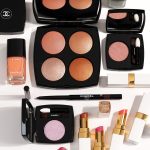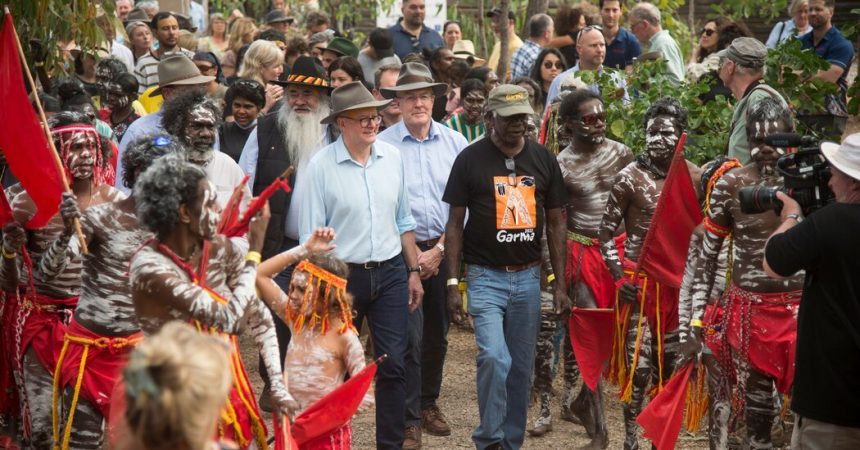The Australia Letter is a weekly newsletter from our Australia bureau. Sign up to get it by email.
Later this year, Australia will hold a referendum to decide whether to recognize the original inhabitants of the continent, by enshrining in the Constitution a body that would advise Parliament on policy and legislation affecting Indigenous people.
Support for the proposed Aboriginal and Torres Strait Islander Voice, as it’s known, has been slowly dipping in polls, and the debate over the issue has at times turned vicious, with reports of an uptick in the vilification of Aboriginal people. Along with my colleague, Natasha Frost, I’ve been reporting on what’s happening and what it says about Australia. (That story will be out soon.)
One of the people I spoke to is Larissa Baldwin-Roberts, who is from the Widjabul Wia-bal Aboriginal tribe and has worked for nearly two decades in Indigenous — or First Nations — activism. As the chief executive of the activist group GetUp, she’s leading what she describes as a progressive campaign in support of the proposal.
Here are some insights she shared with me that didn’t make it into my broader article:
On the challenges of campaigning on the Voice to Parliament
The way that voters are perceiving this referendum is that it is a vote on what people think of First Nations people. That is a very challenging message to craft because, overwhelmingly, people in Australia don’t have the experience of knowing First Nations people — we make up such a small percentage of the population.
People really believe that we have created the problems that we are in. People don’t understand that the reason communities have been hurt over many decades is because of policies by successive governments, whether they were well-meaning or they were intentionally harmful. What we have constantly is: One government comes in, they choose something, another government comes in, they rip out the program. It’s not even that we can’t make progress, it’s that every government thinks they know better around what we need.
Australians really do believe in this idea of a fair go, so it’s almost inconceivable to the middle of Australia that the government could be intentionally doing something wrong to people and we wouldn’t know about it. It’s like, “Well, I would know about that if that’s what was happening. Why would they do that? It has to be you that’s the problem.”
On what this moment could mean for Australia
We know that the majority of Australians want a national unity moment with First Nations people. But right now, we’re selling the details on constitutional recognition and the idea of how inclusion happens, or who we are as a nation, is getting left off the table.
I really believe that we are almost within Australia’s Brexit moment here, if this goes negatively. There’s going to be a lot of regret. It’s going to impact the political psyche of this country and how we move forward together. On an international level, how will people perceive Australia as a nation if a “no” vote happens? There’s not going to be the nuance of what happened in the debate, what was the misinformation. It’s just going to be seen for what it is: a rejection of First Nations people by Australian voters.
On her initial hesitation to support the Voice proposal
I went back and forth around whether or not I supported the Voice to Parliament or the referendum. Many years ago, I campaigned against symbolic constitutional recognition because I didn’t believe that a few words in the constitution would change anything. I hate that we’re going to a referendum, because it’s been so divisive. But I believe that we need to settle the question of who speaks for us. Unless we have a platform where our community actually can speak from, nothing’s going to change.
I don’t believe elected officials in government, even if they are First Nations, have the authority to speak on behalf of the diversity of our communities. We deserve, as First Nations people, to have a political spectrum. If we are able to win an elected representative body that is actually big enough to cover the diversity of these communities, then I have some hope that that platform will provide incredibly strong spokespeople.
We only get change if we change the status quo. And I believe that the referendum is one step in the right direction. But we also need to deal with a lot of the unfinished business around land rights in this country, we need to look at how to make sure that people who live in Aboriginal communities in regional and remote areas actually have access to health and housing and education. We want to see treaties.
On the rhetoric around First Nations issues
People live in this world of zero-sum, of “If I give something, I’m going to lose something.” First Nations people always get placed in this argument around what we deserve as people, and what we don’t deserve. This is a debate around what First Nations people deserve and what somebody else is going to lose, and, therefore, Aboriginal people should get nothing because, otherwise, we’re all going to have to pay to go to the beach.
The reality is, if you can talk about injustice to regular people and how to fix it, most reasonable people can say, “Yeah we should do that.” But in the popular conversation, the idea around basic rights and how you treat people and people’s humanity is being lost right now.
On the tactics of the opponents of the Voice
What the No campaign is rolling out is the same tactics that they’ve been rolling out for the last 30-plus years against First Nations people. Look at their rhetoric talking about division, about zero-sum, about farmers who won’t know where to build fences across their farm because of cultural heritage legislation — all this rhetoric was really popularized when the Native Title Act was first going to be implemented.
It’s not a widely held view, but it is a thing that people are scared of: People really are unsure because they don’t understand how First Nations rights exist in this country. We have an inherent birthright to this land because we’ve been here since time immemorial. That makes a real legislative difference; there are laws at state, territory, federal level that are just about us. We have land rights in lots of places and much more of it is under claim.
So there’s an incredible fear campaign that comes off the back of that, because the government will not implement legislation to settle the conversation, which is a treaty to negotiate with us around what this means: What does this right actually enable us to, what does it mean we are due in terms of our fair share and actually being represented? Australian governments have for decades pushed that off the table, because the middle of Australia are so afraid that they’re going to lose their backyards because of these racist fear campaigns.
On how the debate is affecting Aboriginal communities
Even if we win this, look at the damage this debate has done to our issues across the country. How’s it going to look when millions of people vote “no” in this country? How’s it going to feel?
Aboriginal communities are feeling like they have just been the recipients of a barrage of racism and mistruths and disinformation. We’ve been spoken over and spoken for in a lot of ways. There’s a lot of anger that’s growing within our community around that, and a lot of people are worried about the harm that it’s causing.
Even if we win this, we’re going to have a fight on our hands; there’s going to be backlash. If we lose, we’re going to have to deal with that fallout — we can’t just cop that on the chin and be pushed back a decade and just settle for that.
Now for this week’s stories:









